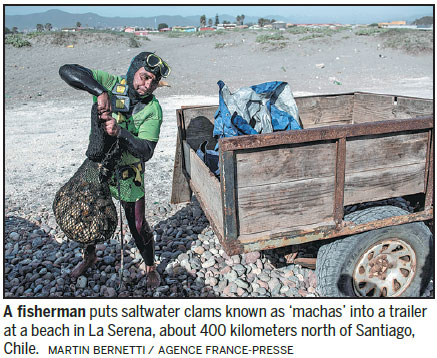LA SERENA, Chile - Long one of the country's favorite seafoods, Chile's macha clam has become a victim of its own popularity, with over-exploitation forcing authorities to ban clam fishing in all but a few areas to help stocks recover.
From humble seaside taverns to exclusive Santiago restaurants, machas have long been a mainstay of the menu in seafood-loving Chile.
Found in the surf-swept sandbanks along the coasts of Chile and southern Peru, the macha is fished in the traditional way by men and women who brave icy waves and riptides to wrest their prize from the sea.
But since August, fishing for machas has been banned in the central regions of Valparaiso, O'Higgins and El Maule after industrial-scale extraction has all but destroyed stocks.
The future for the clam lies further north, where the fishing community in La Serena is held up as an example of a sustainable way forward after strict fishery management plans were put in place to help stocks recover.
"The machas have almost disappeared in Chile, except in this preservation area, where stocks have been taken care of for years," said Franklin Zepada, president of the San Pedro Fisherman's union in La Serena.
On nearby Coquimbo Bay, Zepada says the conservation program and a quota system for catches has secured the livelihood of 175 local macha fishers, including 50 women.
Part of the clam's raw appeal for consumers is the gritty fight to claim the bivalve from an icy Pacific.
In San Pedro, groups of men and women "macheras" defy wind and tide to wade thigh deep into the winter ocean, feeling for the bump of the shellfish in the sand with their bare feet, before reaching down and grappling under the water for the reclusive clam.
"The macha fisherman must be in good physical shape to put up with that. He has to put on 20 pounds of lead to anchor himself to the sand and resist the waves so that the sea doesn't move him around," said Zepeda.
Once out of the water, the machas are sent to a production center managed by the fisherman's cooperative, to be sorted for size and shipped to restaurants and stores.
Conservationists warn that stocks will have to be carefully managed if the clam is to survive, however.
"If there continues to be a lot of fishing activity on the coast, not only will we lose the machas, but probably other species as well," he said.
Agence France-presse

